Exhausted from a trip, you drop your bags at the threshold of a dark, strange, lonely house. The night is late and stormy. No one comes to greet you; no one is home. You did tell them not to make a big deal, not even to pick you up at the airport. “Like, really, seriously, you don’t have to pick me up.” Exact words, in a tone that said “Nothing would make me happier than to reach the gate and see you smiling there.”
A tone that said “please pick me up, I’m so tired. Pick me up, I haven’t seen you in a year and I can’t wait. Pick me up, I’ve missed you and I love you and I want to hear everything that’s happened. I wish you’d stayed suspended, waiting for me, but I know you haven’t, and I’m not sure where the new house is, I’ve never been there. So please pick me up. It’s been so long. Please pick me up.”
But no one did. So, all on her own on a dark and stormy night, 22-year old Kaitlin Greenbriar has gone home.
Life doesn’t hold still, not even for those returning from a yearlong sojourn across Europe. We live in a world where everything can change in the blink of an eye; a year is a yawning crush of time. That is one of the messages of Gone Home, the warmly heartbreaking first release from Portland-based Fullbright Company, a four-person indie late of 2K Marin and best known for Bioshock 2‘s Minerva’s Den, an under-appreciated addition to an under-appreciated game.
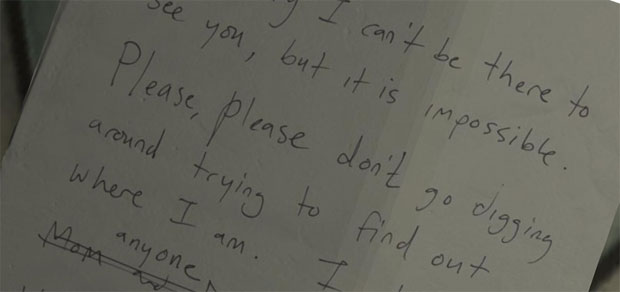
It’d be easy to call Gone Home experimental, but that would mix it in with titles like Dear Esther – not to disparage Dear Esther, a smart game I liked a lot, but one that also lacked anything really… game-y, at least in the traditional interpretation. Gone Home is a pretty traditional game in a lot of ways – it’s just traditional in a nontraditional sense. I don’t want to mix it in with Dear Esther largely because of what I call the Dad Contingency: my Dad, a sometime gamer, would enjoy Gone Home, with its shades of Roberta Williams’ classic Mystery House and object-finding puzzlers, but wouldn’t get as much fun from Dear Esther.
Let me set the stage. It’s June 1995, which becomes relevant for mostly practical and well-considered reasons later on. Kaitlin – Katie – is the elder of two sisters; she’s just finished college and taken a year to visit Europe, a classic American liberal-arts student dream. While she was gone, life happened. Her folks inherited a home a few miles from the one she grew up in and moved the family, including Katie’s sister Samantha, who at seventeen still has a year of high school to go. Moving meant changes – Sam would graduate from a different school, have to make different friends. Dad Terry’s telecommute might change little, but the move comes during a career upheaval of his own. Mom Jan would face a far longer drive to work, but with a possible promotion looming, maybe it’d be worth it long term. Opportunities and changes. Moving means opportunities and changes. But it all happened while Katie was gone, so she got it all through postcards (remember! 1995! Email yes, wireless no. Internet yes, affordable laptops for studenBWAHAHAHA), until today, when she’s come “home” to a “home” she’s never seen.
A “home” with no one to welcome her home.

Still haunted by the movie, no way I’m reading the book, must be a reason it’s the clearest title here, prefer not to guess it. NEXT PUZZLE
What I love about Gone Home is how adeptly it turns so many conventions of the medium on their ear. This is a game. It plays, looks, sounds, and feels like one. It’s not an art-house question mark or a student with more to prove than design capability. It’s a game, the kind you play for fun. It has a pretty straightforward objective: Katie is home, she’d expected some kind of greeting after a year away. Receiving none, she takes an airport shuttle to an address she got from one of Mom’s phone messages. No one picked her up, and that’s weird. No one is home, and that’s weirder. But as you first see through Katie’s eyes, there’s no reason to be frightened until you see what’s pinned to the locked front door.
You know how “really, seriously, you don’t need to pick me up” is code for “pick me up?” Her sister Samantha’s scrawled note is code too:
I’m sorry I can’t be there to see you, but it is impossible. Translation: something is wrong, and I’m trying to minimize it, or I don’t know how bad it is yet, or I can’t say what’s happening because I am prevented for some reason.
Please, please don’t go digging around trying to find out where I am. Translation: your pounding heart is telling you to tear the house apart, but you shouldn’t need to… I left clues inside. Are we talking nudge-wink-you’re-clever, or are we talking… are we talking… something else? Either way you’re not going to like what you learn.
I don’t want Mom and Dad anyone to know. Translation: Christ, Sam, what have you done?
We’ll see each other again some day. Don’t be worried. I love you. Translation: more or less what it says, only now… now I’m worried as hell.
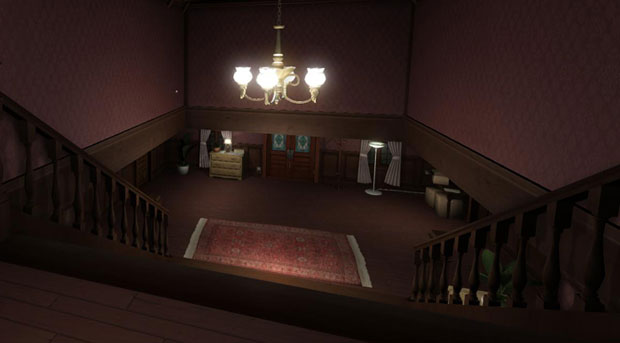
Shall we do it Arrested Development style? Fine…
Now the story of a healthy family that’s tearing itself apart, and the daughter who returns one dark and stormy night from a year abroad to a strange and empty house with an intensely personal mystery that she must solve unaided and alone.
Is this some… some picket fence domesticated drama? Or could something darker be at play here?
People’s homes are fascinating places. They are the physical shelters of our secret souls. The home is the great bastion of who – or what – we are.
No one is an open book in and of themselves. To read the secrets of a person, you need their home; a home is stationary. A home cannot defend itself. A home does not run around hiding clutter when a person enters unexpectedly – that’s what people do. If you are in a home, alone, its owner is laid bare, naked before you. You can never know a person until you know their home, and you will never know their home unless it is defenseless.

But maybe that’s the problem.
Have you ever had the chance to explore – on no clock, and completely unsupervised – the home of someone you love? How do you manage? Do you pick up their things and carry them with you like totems or tools, or put each back exactly where you found it? Do you tiptoe from room to room, or walk, knowing you’re alone? Do you run your finger along innocuous things, the spines of books, the blinds, the lampshades; do you feel the texture of upholstered furniture, as though touch could transfer secrets of kinds other than you’ve already shared? Do you turn the lights off as you exit a room, or leave them on as a marker – i have already explored here?
Consider the person you love the most and then put yourself alone in their home. It doesn’t matter if you live there most of the time yourself. What do you find when you’re looking? And what do you do with the things you find?
Accidentally or on purpose, you pick up a letter written before you were born. You don’t need to be rummaging, this isn’t a hard-target search, but for whatever reason it’s not in a box in a basement, it’s on top of a pile of receipts. Katie is home in her family’s house, families have no secrets, and yeah, she snoops a little – you have to, if you’re going to finish Gone Home, but she doesn’t go at the place with a crowbar. She doesn’t even look in places she wouldn’t normally. It’s that she’s looking with different eyes.
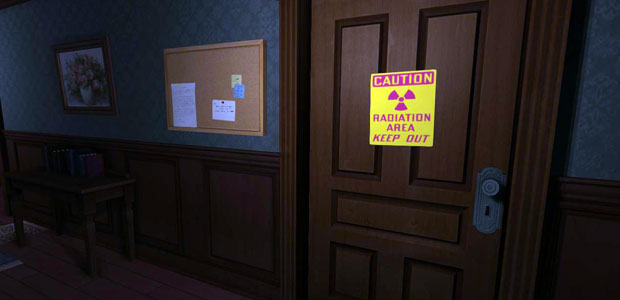
The door to Samantha’s room. Can we get a Girl-After-Steerpike’s-Heart?
What if that letter, older than her, tears the heart out of someone? What if in it are words that explain everything about a person, words that define every secret shame? Cold words, maybe meant to be “instructive,” that callously make mockery of all the hopes and dreams – however secret – harbored by this father, or sister, or mother? What if all of a sudden looking at this letter you realize why, say, your Mom says what she says? Or why some slogan is written on the fridge’s message board?
Not everything is scandalous. Few things are, but scandals are rated on personal scales. What if you see PAST DUE peeking out from under the pile of other detritus, maybe in the house of someone who’s always been carelessly generous, to such a degree you’ve never had reason to imagine that practicalities existed in their minds?
What if you see I will always love you written in the hand of someone with no right to love the recipient at all, let alone always?
What if you see I will never forgive you?
What do you glean from crossed-off items in a planner, or a photo of a stranger?
In a home, suddenly everything becomes imbued with meaning. Why is this next to that? Why are only lemon popsicles left in the box in the freezer? Where is the cat? Why is the garage unlocked? Shouldn’t the laundry be over there and not here? What’s the subtle undertone of that innocuous phone message?
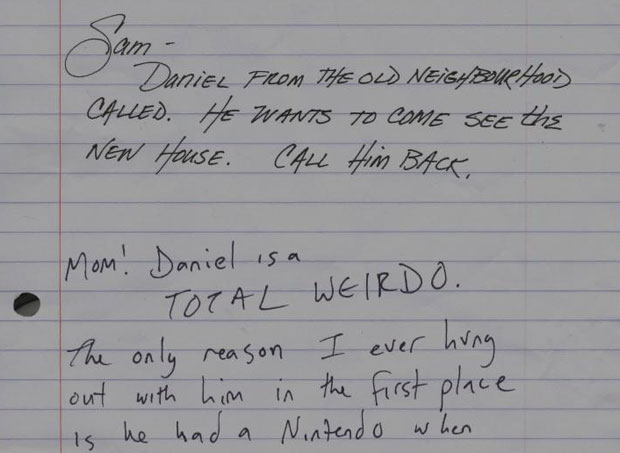
Story of my life, man. Except there were no Nintendo-playing girls in my neighborhood.
Katie Greenbriar, 22, smart, pretty, witty, liked by friends and loved by family, has gone home to a house that typically contains perfectly normal people. Her Dad, Terry, got a couple novels published in the early seventies but they didn’t take off, so now he writes freelance for magazines, usually reviewing consumer products. Her Mom Jan works for the Oregon Forestry Service – “Senior Conservationist” – but as Katie I did pause at one point to wonder, “Did I ever ask Mom what she does?”
Sam is 17 and pretty cool. She likes video games and rad music, and in the family photo she’s got a smile that says “I’m pretty happy here, even at 17 I’m only grinding my teeth a little in this forced family portrait.” Honestly, speaking as Steerpike, the first thing Gone Home made me feel was “dude, it would’ve been sweet to know Sam or Katie when I was that age.”
But the photos aren’t the whole story. Within moments of Gone Home’s opening, a small deus ex machina appears, Sam reading short journal-like thoughts as though “telling” Katie secrets, because she always told Katie everything. It won’t bother you; it’s really no different than finding Voxophones laying around, and it’s how you get to know Sam. Sam, your sister, Sam, who seemed pretty happy in that family portrait, Sam, who ran off into the stormy night after evidently stealing a fair amount of loot from her own house – enough to suggest that she’s not coming back, even if her cryptic note didn’t make that clear. So every now and then you pick up an object and Sam’s voice starts playing in your ear. It’s that voice that tells the story of Gone Home.
No one is a demon and no one is into drugs and the house isn’t surrounded by criminals and no one’s in trouble with the law and I don’t think you can die or even get injured. Are there ghosts? Hauntings? This house has a sort of history, one you’ll piece together a bit as you go. Could something… could something… weird be happening?
It turns out a lot is happening. Every day, a lot happens. Crisis Big and Crisis Small, Events of all sorts, This and That and The Other. The vast majority of it is nothing but life, and frankly not very interesting except for those living it. Yet when we get a peek, when we have time alone in a house, it becomes this rich mystery where everything’s important. As I played Gone Home, I got to thinking, to be honest, about the Tap-Repeatedly community. Some of you I’ve known for nigh-on fifteen years. What if one of you found your way into my house, and knew you had time to explore unfettered? What would you find?
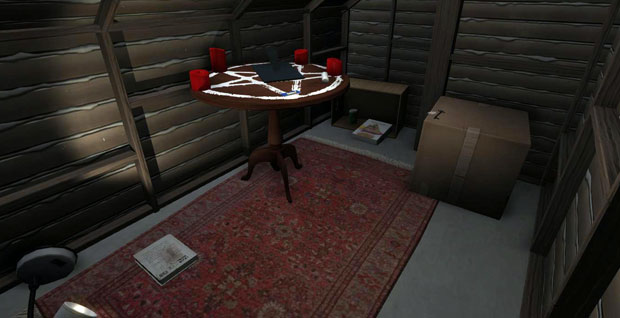
You’re freaked about the pentagram. Me, I’m freaked about the desk lamp just laying there on the carpet. Does the phrase “fire hazard” mean nothing to children these days?
You wouldn’t find heads in the medicine cabinet or anything but you will find products like Gorilla Glue Strain to help with health. No true horrors here. I mean, my secrets – like those of the Greenbriars – they’re of the pedestrian variety. But you might know me differently, just as I, granted access to your secret hearths, might know you differently. That’s what Gone Home is about.
Technically speaking we’re looking at a puzzle adventure, but it’s one designed to be solved. I can’t imagine anyone getting “stuck.” There are certainly things I wasn’t able to discover – the former owner of the house left a few locked cabinets I never opened, and they’re tantalizing in ways I can’t even describe. I’ve also never been able to “see” those 3D pictures that were the rage in the mid-nineties (remember those? damn things. I never saw anything but squiggles), and since there are a couple in Gone Home, I missed whatever they showed too. But I figured out the rest.
I’ll tell you also, you will too. I’m not exactly a deductive wizard and I had the general framework of Gone Home’s denouement worked out within maybe 25 minutes. But that’s not what it’s about, it’s about the rest. The rest was details, I wanted details. I wanted the subtle whys, the secret hows. I wanted to know things that only the home could tell me, because the people in it never would – not Sam, leaving behind clues and messages she so clearly intended me to discover; not Mom and Dad, caught each in the throes of their own sound and/or fury, the entirety of which signified fuck-all. In their case what made it matter was the horrifying revelation that Katie’s parents were human beings, neither perfect saints nor cruelbot sinners, but people, like they’d raised Katie to be.
You can pick up and manipulate practically every interesting object in the house, and the attention to detail is staggering (nutrition labels vary soda can to soda can, by flavor) but I admit I saw through that within 10 seconds. The vast majority of what you’ll interact with is irrelevant to your “quest.” What’s relevant to your quest is figuring out what is your quest. It is a simple game, but it is also a game in a way Dear Esther is not. It didn’t mulch my soul the way Journey did – nothing will mulch my soul the way Journey did – but when the fade-out came it made me do two things. First, it made me put my chin in my hand and ponder, and in that pondering maybe there was a wish regarding the fates of some fictional characters.
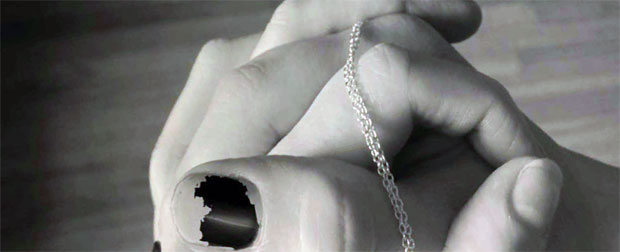
It also made me walk around my house for a while and pretend I was a stranger. Someone who knew me, but had for the first time been granted unfettered access to my condo. I opened drawers I rarely open, I looked at things and objects from (I think) the perspective of someone else. And that too made me appreciate Gone Home, because it’s the first time a game has done that; has made me look around my private domicile, of which I am so very protective, and wonder what it is another would see.
Sorry… still no heads in medicine cabinets. But holy shit, look at some of those prescription bottles… a stranger looking through those? My word, what a picture they’d paint.
Bad? Bad is even if you’re obsessive about nooks and crannies therein, you’ll wrap Gone Home in 3 hours. Thus it comes down not to worth – because Gone Home is worth it – but to budget. Is $15 for that span worth it in your economics? It was to me, and naturally the price will drop come sales. But I’d really like the Fullbright Company to stay in business, and maybe do something else like Gone Home (but bigger! Bolder!), so I’m going to ask you to go ahead and pay for it now rather than waiting for the Steam Arbor Day Sale.
It ends a little abruptly, not in the sense of the story’s ending seeming sudden, but in the sense that it’s a pretty short story. The new house isn’t Cranston freaking Manor, it’s regular-house-sized. Even with locked doors it’s not going to take Katie more than a couple of hours to ransack the place, and that’s pretty much how long you’ll be playing Gone Home. While there’s some room for replayability here, this is a personal, quiet game in which you guess the basics of the story at the 15% mark and the surprises beyond that are very… they’re surprising in a personal, quiet sense, not in an alien-invasion sense.
Gone Home isn’t about Katie Greenbriar or Samantha Greenbriar or The Accidental _____ series or a long-forgotten pharmacist (you’ll see if you play). Gone Home is about… going home. It’s about finding things out in the open that are usually hidden (though out in the open). It’s about who your family is, and who you are as you learn about them. It’s $15 well spent, and it’s something that, for all it is mostly putting two and two together, did have the skill to scare the batshit out of me more than once. But I won’t tell you when or how.
It’s in the house, like all the rest. After all, it’s not a house, it’s a home. Go.
![]()
Tell Steerpike to get some heads for his medicine cabinet at steerpike@tap-repeatedly.com.


Great writeup. I’m glad you wrote it, because though I enjoyed the game, it wasn’t exactly optimized too well for me, which meant that I didn’t get as much out of it as I probably could have.
Also, I was stuck a little on something that turns out to be a story spoiler, but I wrote about that a little in my own blog.
Still, it was an experience worth having. If I were to be the voice of dissent, I miiiight caution people with slightly older computers, such as myself, to wait a bit on it.
As you note on your blog, Amanda, the biggest flaw in Gone Home is that you’ll call the story arc within fifteen minutes, and though it throws a few curveballs here and there – one, at the end, curvy enough to send a chill down my spine until I thought about it and realized it wasn’t possible – it’s intentionally a story about fairly normal people and fairly normal things.
Meanwhile, its great strength is how adeptly it demonstrated that every crisis is a big crisis, even when it’s not a Crysis, and how real it made the guilty-thrill feel of exploring a house and learning everyone’s “deep” “dark” secrets.
I think Gone Home will do well because it got a lot of pre-release interest from folks like RPS, but like so many other games of its nature – very short, very specific, etc – it would’ve done better at $8 instead of $15 and the developers made a mistake not pricing it that way. $15 is a small investment. $8 is a mochiatto. A larger delta would’ve bought it at the lower price to offset the difference.
It might be remembered, though, for being an example of how “games” can be about very mundane things without ever actually becoming mundane themselves… something Dear Esther didn’t quite manage.
I definitely liked it better than I liked Dear Esther. It was more interactive, and the story it told was more interesting to me personally (and I thought conveyed more clearly too, though I guess being clear was not the point of DE).
This review makes me want to go home tonight and stumble around like a stranger in my apartment trying to figure out who I am, just to see what impression I give. “Well she really likes cartoons,” is what I am thinking.
Ahh I’ve been eyeballing this one for a few days now. A tantalizing write-up, I like that it’s nice and short; distractions won’t be a problem if it’s done with in one sitting. I think I’ll make an investment here.
I hope that lamp can be picked up and put on a table. That image embodies distress.
Amanda “AJ” Lange: “If I were to be the voice of dissent, I miiiight caution people with slightly older computers, such as myself, to wait a bit on it.”
I would second that. While it will run with graphics turned down, it seems happier on a faster, more modern system. I got it to run, barely, on my XP Pro SP3 system. It seemed much more comfortable on my Win 7 laptop.
This sounds great!
I think the first thought a random layperson would have schlepping through my living space would probably be, “They make this many board games?” possibly followed by a futile search for a copy of Monopoly.
This does sound great.
Interesting review of ‘Gone Home’ Matt, especially coming from a fellow who admits he doesn’t play all that many adventurish games anymore. I liked what you had to say, and I’m confident I will enjoy the game. This is definitely on my buy/play list for this year or next year.
Pretty good. First game I finished in two years.
Nice piece, Steerpike. That reflection on trying to read and interpret your own private space as a neutral observer is lovely. (I finished Gone Home just last week and we’re going to do a Counterweight on it.)
[…] What a Difference a Year Makes (Matt Sakey): "It also made me walk around my house for a while and pretend I was a stranger." […]